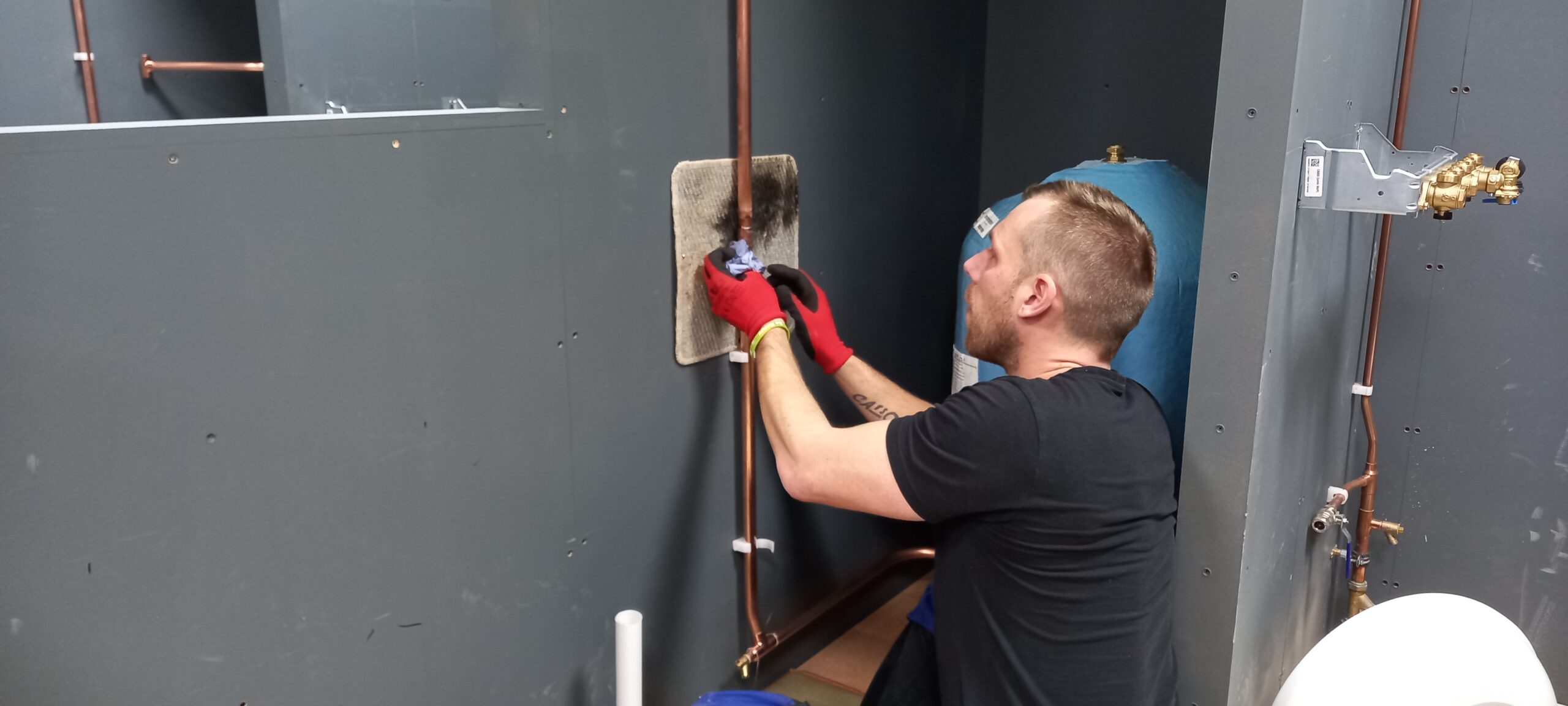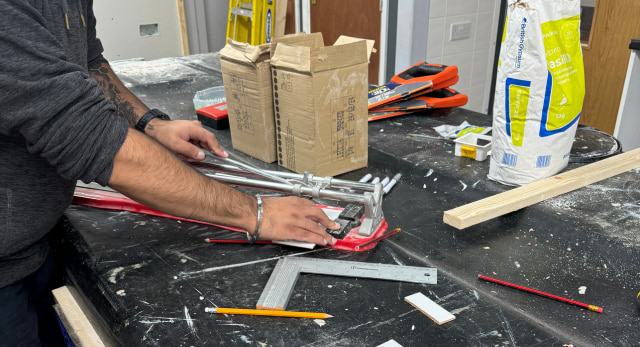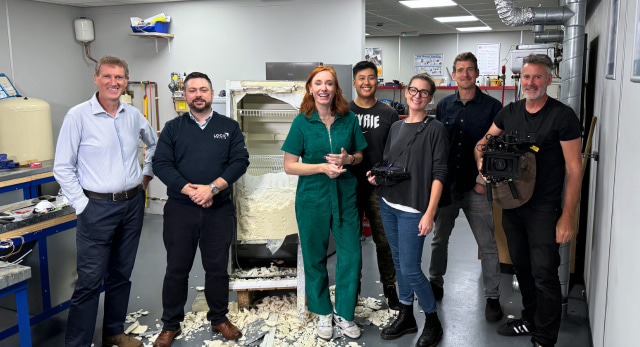With industry reports estimating that over 70,000 new plumbers will be needed by 2032, you might be wondering what qualifications you really need to become a plumber. While it’s true that a formal qualification isn’t always a prerequisite to start working as a plumber, at Logic4training we strongly recommend gaining a recognised plumbing qualification if you’re new to the trade, as it lays the groundwork for a secure and successful career.
Education, Traits and Training
Whether you’re just leaving school or considering a career change, the first steps are to see if there are any entry requirements and understand the options available to you.
Formal Education
The answer is none. However, it’s desirable to have a GCSE in Maths and English. What you do need is a good grasp of English and a personality that’s suited to the job.
Personality Traits
Some of the traits and skills that will help you get along in the trade and that are needed to be a plumber are:
- Good at problem solving – you need to be able to think for yourself
- A good communicator – you’ll often be working as part of a team
- Friendly – to get on with your colleagues and clients
- Fit and healthy – it can be physically demanding work
- Good with your hands – plumbing requires a high level of manual dexterity
- Able to work to deadlines – so you need to be good under pressure
Apprenticeships
The traditional plumbing apprenticeship is a tried-and-tested pathway, usually lasting about four years. This route combines on-the-job training with formal instruction, allowing you to earn as you learn.
A plumbing apprenticeship usually takes between 3 and 4 years, and is best suited to school or college leavers. They can be structured in many different ways and to different levels and because of this, it is important to see if the qualifications that you gain are exactly what you are looking for.
At the end of the plumbing apprenticeship, you’ll come away with an NVQ Diploma at Level 2, 3 or even 4, depending on how long you trained for.
External resources like the City & Guilds plumbing qualifications page provide further detailed information on recognised qualifications that boost your career prospects.
Vocational Training
Shorter courses, sometimes known as fast-track courses, like the Level 2 Diploma in Plumbing and Heating that leads to a Level 2 NVQ Diploma in Plumbing and Heating. These courses are structured and offer you a quicker way to learn the practical abilities needed to become a plumber.
Vocational courses vary in length due to the different requirements set by the accreditation bodies of each course. A Level 2 Diploma in Plumbing and Domestic Heating is a common course that takes 6 weeks to complete and is designed for new entrants who have little to no plumbing experience.
After completing this, most plumbers look to complete a Level 2 NVQ so that they can apply for their JIB Plumbing CSCS card. The time it takes to complete the Level 2 NVQ varies as it has multiple routes and is also dependent on the learner’s access to jobs that can be used in the assessments. If you’re looking to do this Level 2 NVQ it roughly takes between 1-2 months. It’s important to know that if you have been working in the plumbing industry without a qualification for at least 3 years, you just need to complete the Level 2 NVQ in Plumbing and Heating.
For a deeper look at how long both routes might take, check out our article on how long it takes to become a plumber.
Developing Plumbing Specific Skills
The journey to becoming a skilled plumber isn’t just about earning a qualification; it’s also about developing a set of specific skills to complete plumbing work safe and effectively.
Technical Skills
Whilst there will be a difference in the structure of training for plumbing apprenticeships and vocational courses, you learn a set of technical skills that cover the following topics:
- Pipework skills – including bending and soldering.
- Installing and fault finding for cold and hot water systems as well as central heating systems.
- Electrical installation of plumbing and heating components as well as electrical safe isolation.
- Installation and maintenance of above-ground drainage systems
Problem Solving
During the time that you are training, you will be given practical tasks to complete that involve you to think about the best way to complete it.
When you start learning in the plumbing industry, you’ll have a colleague, mentor or trainer there to help you build this skill and over time, it will develop so that you can swiftly and efficiently complete the job.
Communication & Customer Service
Engaging effectively with customers and other tradespeople makes a huge difference in building your reputation. Clear communication and consistent reliability build trust that can lead to repeat business and valuable referrals. Additionally, by actively listening to client feedback and collaborating with peers, you position yourself as a knowledgeable and dependable professional, which can lead to increased opportunities and industry recognition.
For further insights into what it takes to become a plumber, explore our how to become a plumber page.
Certifications and Registrations: Upskilling as a Plumber
Once you’ve gained the necessary training and qualifications, you may look to upskill yourself to expand your skill set and services.
- JIB Plumbing CSCS card: Often required on construction sites, this card proves your competence and safety knowledge. You will need to hold a Level 2 NVQ in Plumbing and Heating to apply for your JIB Plumbing CSCS card.
- NVQ Level 3: If you are looking to complete an apprenticeship, you may want to consider the Level 3 NVQ as it will have the option to learn gas elements as well as plumbing.
- Gas Managed Learning Programme: This vocational course is a quicker option to allow you to work on gas. This is included in our plumbing packages or is available on its own here.
- Gas Safe Registration: If you plan to work with gas appliances, it is mandatory that you become Gas Safe Registered. You will need to have completed an ACS gas qualification and hold your CCN1 and CENWAT to apply to the Gas Safe Register.
- Heat Pumps: With a Level 2 NVQ in Plumbing and Heating, you can start your upskill training route to become qualified to work on heat pumps.
Conclusion
The plumbing industry is not only a vital part of the building services industry, but it’s also a rewarding career path that offers plenty of opportunities for growth. With the right mix of training, hands-on experience, and certifications, you can build a robust career that stands the test of time.
We encourage you to explore each pathway and choose the one that provides you with the needed qualifications that align best with your ambitions. Remember, every step you take is a step toward becoming a skilled professional who makes a real impact on communities.
If you would like to speak to our team to discuss the best option for you, please call us on 020 8845 7222.









